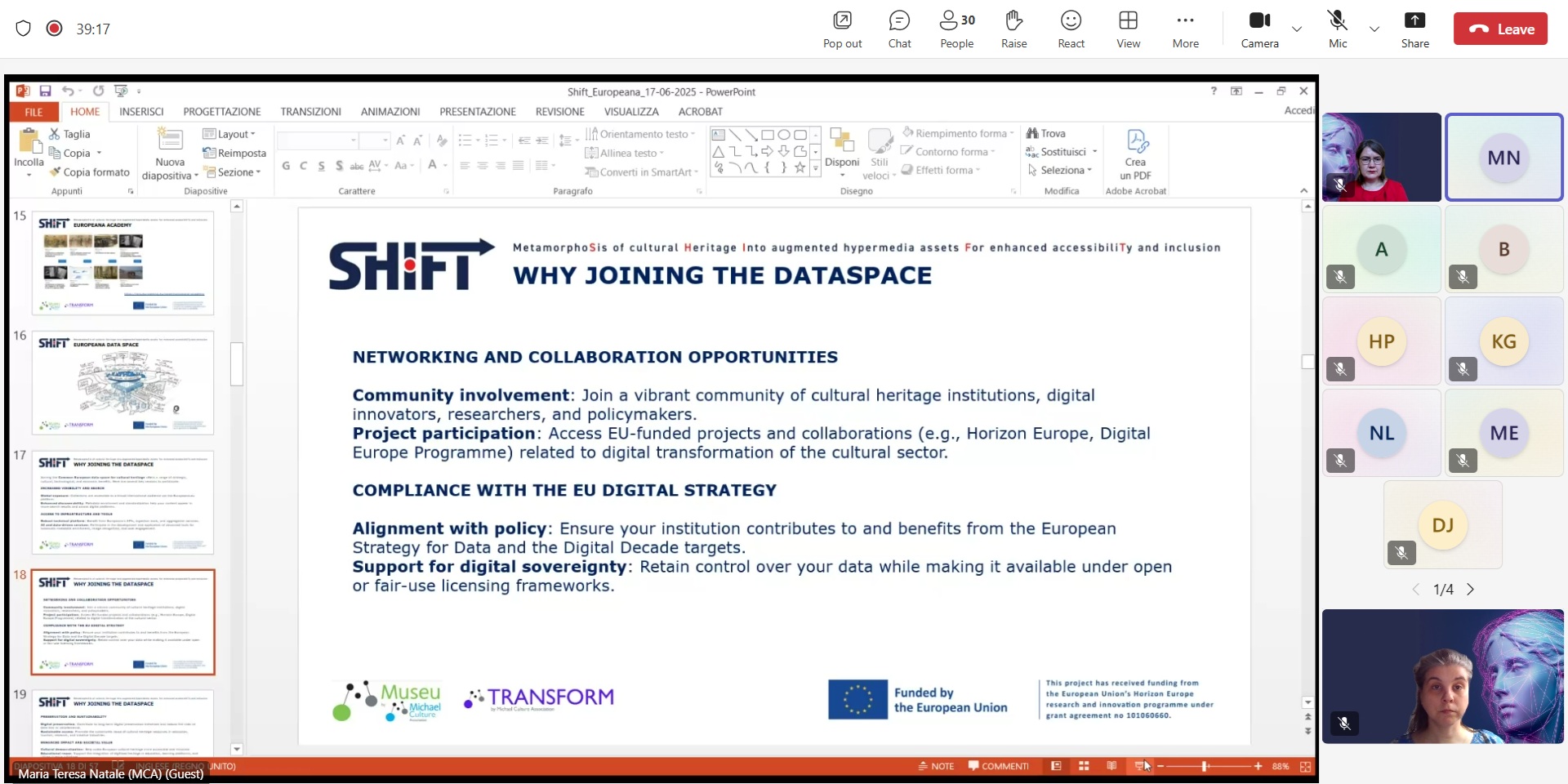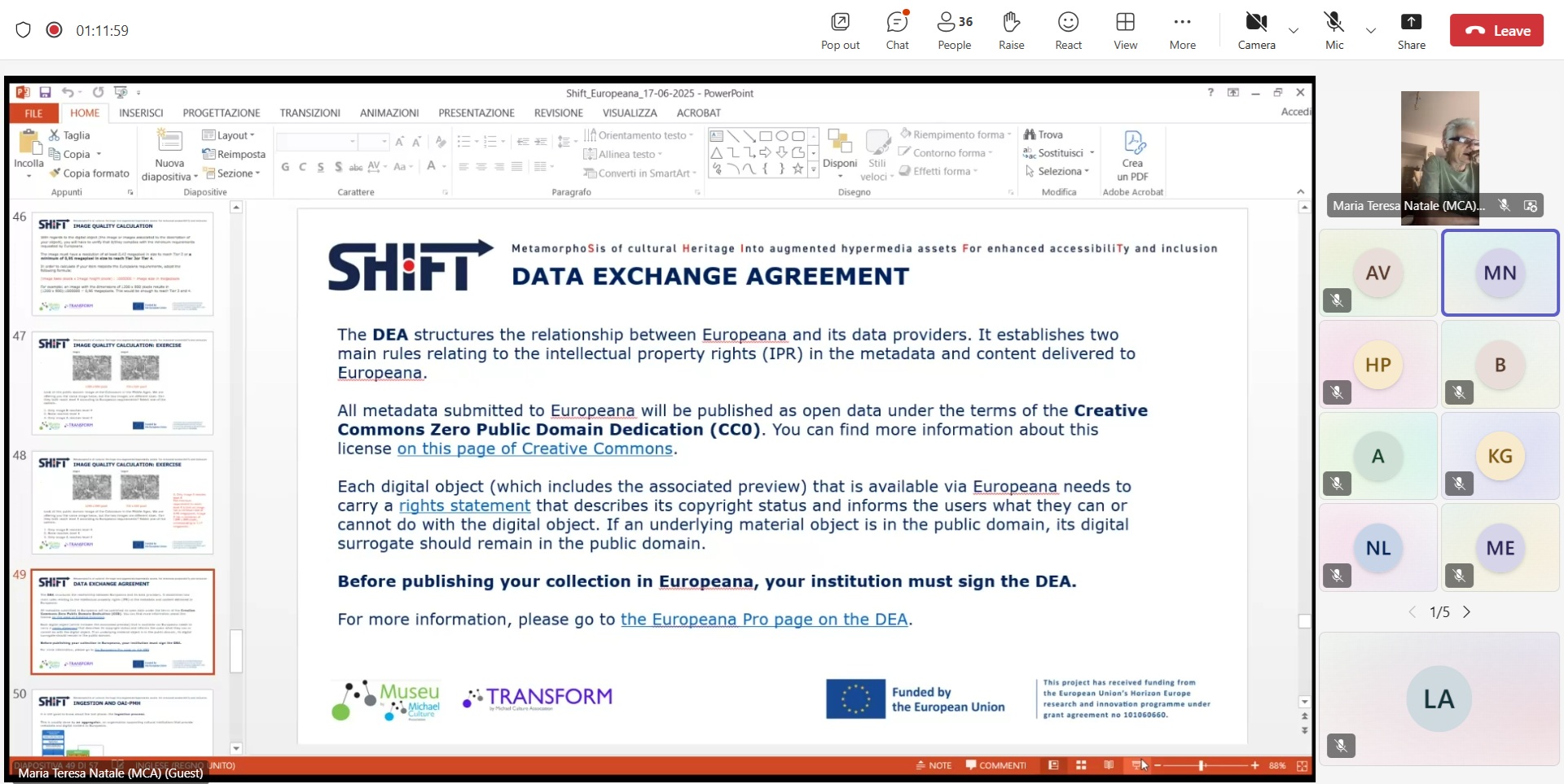On 18 June 2025, the SHIFT initiative hosted one of its expert-led webinars titled “Advantages of Sharing Your Collection Online”, presented by Maria Teresa Natale, senior project manager at the Michael Culture Association (MCA) and coordinator of MUSEU-HUB. This session offered valuable insights into the strategic, technical, and practical aspects of sharing cultural heritage collections online, particularly through the Europeana Initiative, which serves as a central platform for digital cultural heritage in Europe.
Maria Teresa Natale, with more than two decades of experience in digital cultural heritage projects, brought a wealth of practical and policy-level insight to the event. The webinar was particularly targeted at professionals from galleries, libraries, archives, and museums (GLAMs), focusing on increasing their capacity to manage digital collections in line with Europeana’s standards and publishing requirements.
At the heart of the session was the Europeana Initiative’s Common European Data Space for Cultural Heritage, which provides robust infrastructure, open-access tools, and strategic policy alignment to support the digital transformation of cultural institutions. Participants learned that sharing digital collections online is not only about public access, but also about enriching the metadata, ensuring discoverability, managing intellectual property rights, and enabling reuse across various educational and creative domains.

One of the main themes discussed was the aggregation process and the function of aggregators. Aggregators like MUSEU HUB collect, standardize, and deliver metadata from various cultural heritage institutions (CHIs) to Europeana. They offer training, technical support, and ensure compliance with Europeana’s metadata standards and publishing frameworks.
A significant portion of the webinar focused on metadata, its types, and the role it plays in improving content discoverability. Metadata was categorized into descriptive, structural, and administrative, each serving distinct purposes in the digital environment. The Europeana Data Model (EDM), a core component of the aggregation process, was introduced as the standard metadata schema enabling the integration of heterogeneous data sources from archives, libraries, and museums.
One of the key messages of the webinar was the importance of aggregators as intermediaries between institutions and Europeana. Aggregators collect metadata from content providers and assist in their refinement and transformation according to Europeana’s metadata schema—the Europeana Data Model (EDM). The EDM allows for the integration of metadata from various domains (libraries, museums, archives) and supports semantic enrichment through linked data technologies.
Participants were introduced to the three main classes of EDM metadata:
- edm:ProvidedCHO (descriptive and structural metadata of the cultural object),
- edm:WebResource (administrative metadata of the digital surrogate),
- ore:Aggregation (metadata about the aggregation process itself).
The webinar emphasized metadata quality as a cornerstone of digital visibility. Europeana applies a tiered system for both metadata and digital content quality, with higher tiers offering greater discoverability and reuse potential. Tools such as the MINT Mapping Tool were presented as solutions for institutions to align local metadata schemes with EDM.
Through illustrative examples and interactive exercises, Natale explained how semantic enrichment of metadata—using controlled vocabularies such as Wikidata, VIAF, AAT, and GeoNames—can substantially enhance the visibility and searchability of cultural objects. This enrichment enables users to access content through more precise and interconnected pathways, supporting advanced use cases in education, research, and creative industries.
The webinar also addressed rights management and licensing, explaining how cultural institutions can apply Creative Commons licenses and Europeana Rights Statements to govern the reuse of digital assets. These tools ensure transparency and compliance with EU digital policies, while also promoting open access when appropriate.
To support the quality and usability of digital content, the session introduced the Europeana Publishing Framework (EPF), which outlines quality tiers for both metadata and digital content. Higher-quality submissions, characterized by richer metadata and higher-resolution images, receive greater visibility and are more likely to be reused in educational and cultural projects.
The final portion of the webinar addressed the data ingestion process, which includes metadata mapping, validation, and harvesting via the OAI-PMH protocol. Aggregators play a vital role in this phase, particularly in supporting institutions with technical constraints. Participants were encouraged to begin with pilot datasets—even as few as ten digital objects—and take advantage of MUSEU-HUB’s free analysis and advisory services under the Europeana Digital Service Infrastructure (DSI).
In conclusion, the webinar underscored the transformative potential of digitizing and sharing collections through Europeana. It presented a comprehensive roadmap for cultural institutions: from understanding metadata structures and semantic technologies to adopting sustainable licensing practices and leveraging EU-funded digital infrastructure. By embracing these tools and frameworks, institutions not only increase their digital presence but also contribute meaningfully to the democratization, sustainability, and long-term preservation of European cultural heritage.

For further training and resources, institutions were invited to explore the Europeana Academy, as well as participate in MCA’s ongoing survey assessing digital maturity within the GLAM sector.
Download the webinar presentation HERE.
Watch the recording HERE.
The webinar is part of the SHIFT project (Metamorphosis of Cultural Heritage Into Augmented Hypermedia Assets for Enhanced Accessibility and Inclusion) that is being funded by the European Union Horizon Europe program.

More about SHIFT project on: https://shift-europe.eu/
